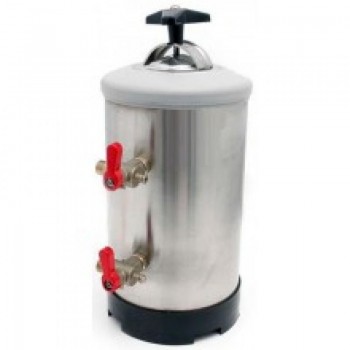Water softener DEP 20 Krupps
Water softeners
Water softeners: what is it and how to choose it
Type, size, dosed regeneration based on a timer - when deciding to buy a water softener, there are a few things you need to know about when making a choice. In the end, you want to choose the system that is ideal for your needs. Don't worry, this article prepared by Altezoro specialists will briefly tell you what water softeners are and what to consider when buying, helping you in the decision-making process!
Water softeners: types
Buy water softeners
There are different types of water softeners, each with its own pros and cons. On the one hand, we have ion-exchange water softeners using salt. This is the most common and popular type; on the other hand, we have salt-free softeners, although they are not softeners in the real sense of the word. What makes the most sense to you depends entirely on your individual circumstances as well as your personal preferences.
Ion exchange systems based on salts. Simply put, a conventional salt water softener uses a process called "ion exchange" to remove hardness minerals - mainly calcium and magnesium ions, but also iron and others - from the water and replace them with sodium (Na+) or, in rare cases, potassium (K+). This is by far the most common method to soften domestic water today.
Salt-free softeners of drinking water. Then we have salt-free water softeners, which we shouldn't call "softeners" but "conditioners" really. What for? Because no matter what treatment method they use, they won't actually extract any difficult minerals from the water. Instead, they are trying to stop these minerals from sticking to surfaces and accumulating in pipes and appliances that form deposits. In other words, products from well-known brands such as CMA (Italy) lineup, which is represented by filters such as DVA8, DVA12, DVA16 and Krupps (Italy) models DEP12, DEP16, DEP20, have a simple descaling effect. The general consensus is that salt-free air conditioners are better than no water softener at all, but not as efficient as traditional salt-based systems. Processing methods include the use of citric acid or polyphosphate as chelating agents that bind hard water ions so they remain soluble. Other conditioners use catalytic media that cause calcium carbonate to form into large crystals that have little surface affinity.
Magnetic water softeners. The devices are somewhat controversial, to say the least. According to their manufacturers, these electronic "plug and play" devices simply wrap around a main water line (ideal for tenants) to generate a magnetic field that changes the electromagnetic properties of the calcium carbonate. As a result, mineral particles are repelled by the surfaces of the pipes and from each other, which, in turn, prevents the formation of scale.
What else should be considered when choosing water softeners?
Having discussed the different types of water softeners that you can buy, we would like to talk about a few more options and considerations to keep in mind when choosing the model that you regard as suitable.
1. Price. How much a water softener costs depends on its type, size, brand, and features.
2. Capacity (size) and flow rate. The size or capacity of a water softener indicates how many grains of hardness it can extract before it needs to be regenerated.
You can buy water softeners, as well as any equipment for washing dishes, on our website with delivery to all major cities in Slovakia and the Czech Republic.






